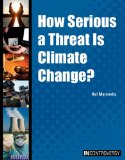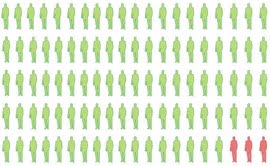Global climate change Controversy
 Climatologists and climate-change deniers agree on at least one thing this week: everyone is awaiting the landmark U.N. report on climate change that will be presented at next week's meeting of the Intergovernmental Panel on Climate Change (IPCC).
Climatologists and climate-change deniers agree on at least one thing this week: everyone is awaiting the landmark U.N. report on climate change that will be presented at next week's meeting of the Intergovernmental Panel on Climate Change (IPCC).
The report will detail the scientific and technical elements of climate change, and will note that greenhouse emissions continue to rise. It will provide policymakers with actionable data and recommendations.
The report will also include data that indicates the rate of warming from 1998 to 2012 slowed to about half the average rate since 1951, citing natural variability in the climate system, as well as cooling effects from volcanic eruptions and a downward phase in solar activity.
All of this will be in the report. What won't be there is a more thorough explanation for the supposed decline in warming.
Climate skeptics have used the lull in surface warming since 1998 to cast doubt on the scientific consensus that humans are warming the planet by burning fossil fuels and cutting down CO2-absorbing forests.
Because of this, according to documents obtained by the Associated Press, government officials from the U.S., Germany, Belgium and Hungary are calling on the IPCC to include a detailed, scientific explanation.
"I think to not address it would be a problem because then you basically have the denialists saying, 'Look the IPCC is silent on this issue, '" Alden Meyer, of the Washington-based Union of Concerned Scientists, told the AP.
But some scientists, including Gavin Schmidt, Deputy Chief of NASA's Goddard Institute for Space Studies, are arguing that the explanation is arbitrary. The data looks at a 15-year time period, while the overall report is meant to cover the big picture.
"This whole thing is just a blogstorm in a teacup, " the British climatologist told CBSNews.com "The IPCC is there to assess the literature and tell people what the scientists are saying." The report is meant to explain what scientists have reported, not conduct original science, he continued. "The idea that IPCC needs to be up to date on what was written last week is just ridiculous."
There are a handful of reasons why data might indicate that global warming seems to be slowing.
First of all, the data in the IPCC report starts with 1998, which was an unusually warm year. When scientists draw a trend line through climate data from 1998 to 2013, the increase is barely significant. But if, instead, the data set starts with 1970 and goes through to 2013, the global rise in temperature continues at an even rate.
"1998 was a single year that was so extreme, even more of an extreme outlier than people realized at the time, " Schmidt explains. El Nino events contributed to the extreme temperatures. More recently, 2010 and 2011 were big years for La Nina events, a natural cooling cycle.



|
How Serious a Threat Is Climate Change? (In Controversy) Book (Referencepoint Press)
|
|
Lies, Damned Lies, and Science: How to Sort Through the Noise Around Global Warming, the Latest Health Claims, and Other Scientific Controversies (FT Press Science) Book (FT Press) |
 Scientific opinion on climate change is that the Earth's climate system is unequivocally warming and it is more than 90% certain that humans are causing it through activities that increase concentrations of greenhouse gases in the atmosphere, such as deforestation and burning fossil fuels. This scientific consensus is expressed in synthesis...
Scientific opinion on climate change is that the Earth's climate system is unequivocally warming and it is more than 90% certain that humans are causing it through activities that increase concentrations of greenhouse gases in the atmosphere, such as deforestation and burning fossil fuels. This scientific consensus is expressed in synthesis...